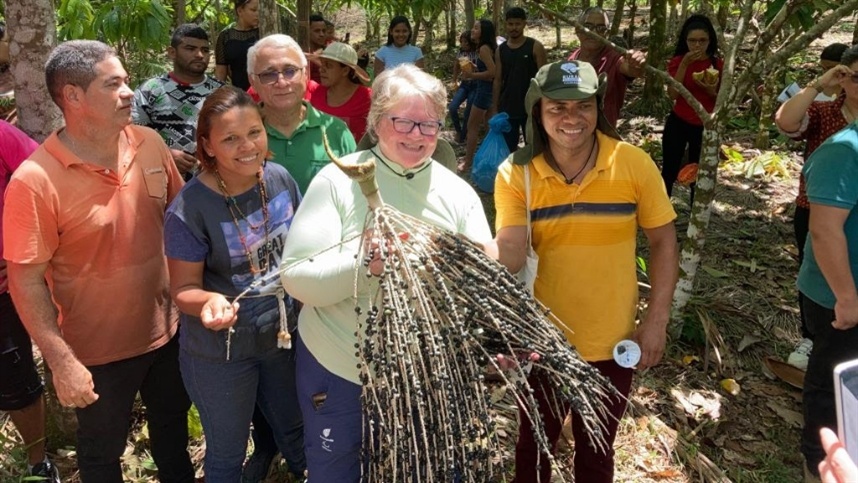
Therese Coffey, UK Minister for Environment, Food and Rural Affairs, met with sustainable agriculture projects in the Quilombola community of São Manuel this Tuesday (January 3). The visit comes after the announcement of the launch of the second phase of the Sustainable Rural Project (PRS) in the Amazon, funded by the British government.
The community of São Manoel is located in one of the municipalities that will benefit from this project, the city of Moju in the northeastern region of Pará, which in the coming weeks will announce the selection of the projects that will be received. resources.
The British Minister arrived in Para along with the British Ambassador to Brazil, Stephanie Al-Khaq. During this trip, the delegation was able to learn about the technique of agroforestry systems to produce typical food items such as Brazil nuts, acai, black pepper, cubuasu and cocoa. Coffey asked residents about the challenges facing socio-biodiversity production chains in the Amazon. In practice, we have seen the link between climate action (support for low-carbon agriculture), poverty reduction and growth promotion.
“Before coming here, I met the Governor of Para. It is a sign that the United Kingdom is ready to cooperate with this state and with Brazil as a whole to implement the concept of bioeconomy. Today was a very special day. Looked at good techniques to produce with low carbon emissions. It is knowledge passed down from generation to generation using fertilizers and other materials taken from nature. Local communities are custodians of the Amazon and play a fundamental role for the planet,” the UK minister said.
The Sustainable Rural Project is the result of a partnership between several actors:
· Resources come from the British Government through the International Climate Fund;
· These resources are administered by the Inter-American Development Bank (IDB);
· MAPA (Ministry of Agriculture, Livestock and Food Supply) aligns financial objectives with public policies defined by the Central Government;
· In the specific case of Pará, the State Secretariat for Environment and Sustainability (SEMAS) participates in the implementation strategy of the project and provides logistical support for actions and
· IAPS (Brazilian Institute for Development and Sustainability) takes care of implementation, implementation and monitoring of initiatives.
The United Kingdom is Brazil’s third largest partner in terms of climate and nature. 250 million pounds of international climate finance has gone to Brazil.
Before visiting the community of São Manoel, the British minister participated in the inauguration of President Luiz Inácio Lula da Silva last Sunday (January 1).
The next day, in addition to Governor Helder Barbalho, he met with Ministers of Agriculture, Carlos Favaro, Environment and Climate Change, Marina Silva and Indigenous Peoples, Sonia Guajajara. Earlier in the day, he met Minister of Racial Equality, Aniel Franco.
“I was very grateful to meet the representatives of the Brazilian government on the first day. We already had a relationship with Brazil, but it is clear that the ambitions and agenda of this new Lula government puts the environment and sustainable agriculture at the center, linking the fight against climate change and the creation of prosperity. I see many possibilities to advance our partnership in the field of bioeconomy”, assessed Minister Therese Coffey.
About Sustainable Rural Project (PRS) in Para
Special attention is paid to supporting nature-based solutions to reduce deforestation, aiming to promote sustainable use models of forests, mainly based on extraction, land reclamation and intensified degraded areas. Deforestation in the past and creation of alternative sources of income to replace the income from deforestation with relevant participation of local communities.
The PRS is part of a £7.42 million project, of which £62.3 million will benefit the states of Para, Rondônia and Amazonas. The project has a specific focus on strengthening sustainable value chains in the region such as coffee, nuts, fish, acai and cocoa.
About the community of SÃO Manoel – Municipality of MOJU (PA).
Jambuasu territory is located 15 km from the municipal seat of Moju, across the stream of the same name, and is inhabited by rural black people who mostly make a living from agriculture, animal and plant extraction.
The community belongs to the Quilombola region known as Jambuasu, where there are 15 Sangams with 230 hectares of SAFs (Biodiverse Agroforestry Systems), the main crops being acai, cocoa, gubuasu, black pepper and forest species. The main processed product of agribusiness is açaí. More than 40 workers from the community are employed.
About seven years ago the community began to change its handling of the soil and its planting and cultivation. Initially, they were Mr. A cooperative in Michinori, Tomé-Açu municipality, where they received guidance and support to start and develop activities.
They received seedlings and seeds to begin the transition to handling crops in the community, and Mr. Michinori received instructions on how to prepare the fields without fire, how to dig and plant at proper spacing, how to thin the plants after planting and layer them around the plants, and how to keep the surrounding soil moist.
They were also instructed on plant fertilizing, crop maintenance, harvesting, marketing, and resource management.
Currently, the community does not use fire, productivity has grown and diversified, significantly increasing the income of local producers and reducing carbon emissions.
This information was released from the Embassy of the United Kingdom in Brazil

“Reader. Infuriatingly humble travel enthusiast. Extreme food scholar. Writer. Communicator.”






